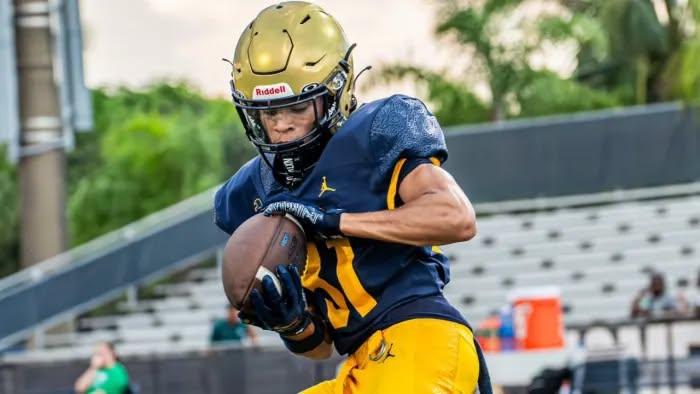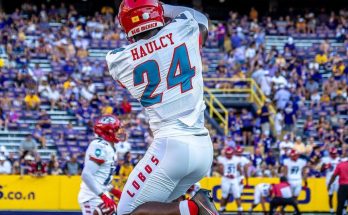Notre Dame’s football team is fully locked in on the upcoming season, placing a strong emphasis on preparation and strategic execution.
Notre Dame’s football team is diving headfirst into preparations for the upcoming season with a sense of urgency, focus, and determination that reflects both the expectations of the program and the hunger within the locker room. As summer workouts intensify and the coaching staff hones in on the finer details, there’s a clear sense that this year is about much more than just playing football—it’s about chasing greatness, overcoming past shortcomings, and carving out a season that could redefine what Notre Dame football stands for in the modern era of the sport.
The Fighting Irish are no strangers to the weight of expectation. With a history steeped in tradition and championships, every season at Notre Dame begins with hope and the belief that a national title is within reach. But this year’s preparation feels especially intense. The coaching staff, led by Marcus Freeman, has been meticulous in every facet of offseason planning. From revamped playbooks to specialized positional drills, no stone is being left unturned. The team is driven by the sting of past missed opportunities, close losses that could have tipped the balance of their season, and the realization that they have the talent to compete with anyone in the country—if they can execute at the highest level consistently.
Preparation for the upcoming season started the moment the previous one ended. Rather than allowing disappointment to linger, players and coaches alike redirected their energy toward growth. Spring practices were used not just to install schemes but to establish a tone of accountability. Veterans took the lead, demanding more from their teammates, while younger players were thrust into the fire and expected to rise. Leadership has become a cornerstone of Notre Dame’s culture this offseason. Players like quarterback Riley Leonard, the transfer from Duke, have embraced their roles as vocal leaders, bringing not only talent but a new edge to the offense.
Offensive coordinator Mike Denbrock has worked closely with Leonard to build an offense that plays to his strengths while maintaining the physical identity that Notre Dame is known for. The quarterback position has been under a microscope in recent years, with fans and analysts alike searching for the kind of game-changing presence under center that can elevate the Irish against top-tier competition. Leonard brings experience, poise, and athleticism, and his work ethic has earned immediate respect within the locker room. He’s been one of the first players in the film room and the last one to leave the weight room, setting the tone for the rest of the offense.
The offensive line, long considered a point of pride at Notre Dame, has been laser-focused on getting back to dominance. Veteran leadership in the trenches is guiding a talented group that includes rising stars and highly rated freshmen pushing for playing time. The coaching staff has emphasized not just physicality but precision—correct hand placement, footwork, and communication are drilled daily. This isn’t just about opening holes for the running backs or protecting Leonard; it’s about imposing their will and dictating the pace of the game from the line of scrimmage.
Notre Dame’s backfield is another area of strength heading into the season. The running back room is loaded with depth and versatility, with each player bringing a different style to the table. They’ve spent the offseason not just improving conditioning and explosiveness, but also focusing on pass protection and route-running to become more complete weapons. There’s an understanding that in today’s college football landscape, a dynamic offense must have backs who can impact the game in multiple ways, and that’s exactly what Notre Dame is working to build.
At wide receiver, the Irish are emphasizing timing, chemistry, and discipline. Drops, missed routes, and miscommunication were costly at times last year, and wide receivers coach Chansi Stuckey has made it a mission to correct those issues. The players have responded with a workmanlike mentality, often staying after practice to run extra routes and catch hundreds of balls a day from the JUGS machine. The goal is consistency, and the message is clear: talent alone won’t be enough to win big games. Execution and reliability are paramount.
Defensively, Notre Dame is building off a strong foundation, but they’re not settling for good—they want to be elite. Defensive coordinator Al Golden has pushed the tempo in every drill, demanding speed, aggression, and smart play. The front seven has been a focal point this offseason, with an emphasis on creating more pressure without sacrificing gap integrity. Linebackers are being cross-trained at multiple spots to increase versatility, and defensive linemen are being taught new techniques to counter the increasingly creative offenses they’ll face this season.
The secondary, meanwhile, is being forged through fire. With several high-octane offenses on the schedule, the Irish know that they’ll be tested through the air. Corners and safeties are being drilled in man coverage, zone drops, and situational awareness. Communication has become a key priority, as breakdowns in coverage were costly at key moments last year. Veteran leaders like Xavier Watts are mentoring younger players, creating a culture where film study and preparation are just as valued as athletic ability.
Special teams have also received renewed focus. In close games, the difference between winning and losing often comes down to execution in the kicking game. Notre Dame is determined not to be caught off guard. Every practice includes dedicated time for field goal units, kickoff coverage, and punt return schemes. It’s about minimizing mistakes and finding hidden yards—details that championship teams don’t overlook.
Beyond the physical preparation, the mental side of the game has been a major emphasis. Sports psychologists have worked with players on visualization techniques, stress management, and building confidence. Team meetings often begin with discussions about mindset, discipline, and the importance of staying locked in. Freeman understands that college football isn’t just a test of skill—it’s a test of mental toughness, especially in high-pressure environments. That’s why the team has embraced challenges during offseason training, from early-morning workouts to grueling team-building exercises designed to simulate adversity.
The schedule isn’t doing Notre Dame any favors, and they know it. With marquee matchups against top-ranked programs, every week will require the team’s best. That’s why the current preparation is so thorough. There’s no room for complacency. Every rep in the weight room, every sprint, every minute of film is part of the larger puzzle. The Irish are chasing something bigger than a winning record—they’re chasing relevance at the highest level, the kind of season that can put them back in the College Football Playoff and prove that Notre Dame belongs in the conversation with the nation’s elite.
Recruiting momentum has also played a role in the team’s sense of urgency. With high-profile commitments and visits from elite prospects, there’s a palpable energy around the program. Current players understand that they’re not just playing for this season—they’re laying the groundwork for the future. That responsibility is not taken lightly. Veteran leaders have embraced the role of mentors, setting examples both on and off the field.
The strength and conditioning program has been another area of focus. Under the direction of Director of Football Performance Matt Balis, the players have embraced a high-intensity regimen that emphasizes explosiveness, endurance, and injury prevention. Every player has personalized metrics they’re working toward, and the buy-in has been total. Conditioning drills are brutal, but there’s a collective belief that the harder the work now, the easier the games will feel come fall.
Freeman’s fingerprints are on every aspect of this preparation. He’s involved in team meetings, meets with individual position groups, and maintains an open-door policy that encourages honest communication. Players speak about him with respect and admiration, not just for his football knowledge, but for his commitment to building a culture of excellence. He doesn’t just preach accountability—he lives it. And that authenticity resonates.
As the days count down toward the season opener, every member of the Notre Dame program knows what’s at stake. It’s more than wins and losses. It’s about pride, legacy, and the opportunity to bring something truly special to South Bend. The preparation may not always be glamorous—there are no fans in the stands during 6 a.m. workouts—but it’s where championships are built.
Notre Dame isn’t talking much about goals to the media right now. They aren’t making bold predictions or getting caught up in hype. Instead, they’re putting their heads down and grinding, fully committed to the process. And if that process continues to build the way it has, they won’t need to say anything. Their play on the field will speak volumes.
The journey to greatness isn’t easy. It requires sacrifice, discipline, and unity. But for the 2025 Notre Dame football team, those aren’t obstacles—they’re the foundation. And with each day of intense preparation, the Irish move one step closer to the kind of season that could live forever in Notre Dame lore.



